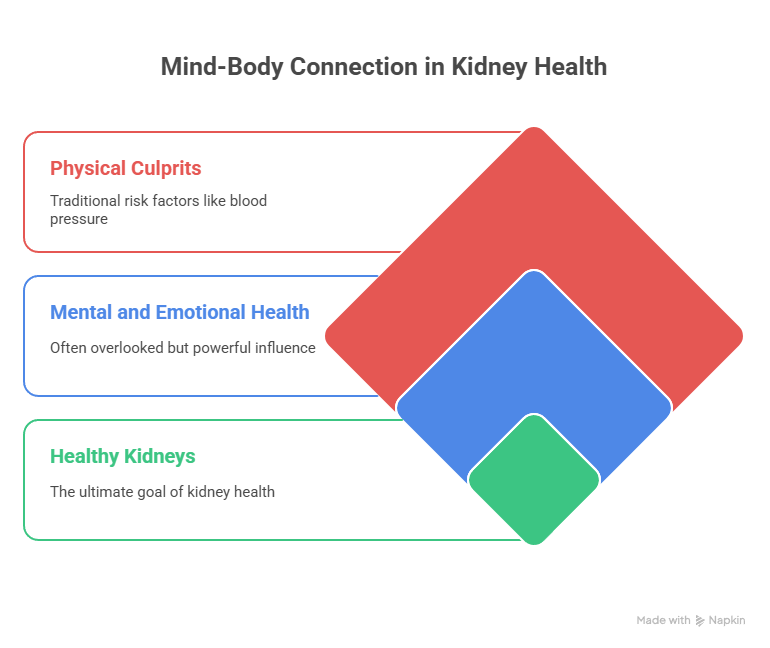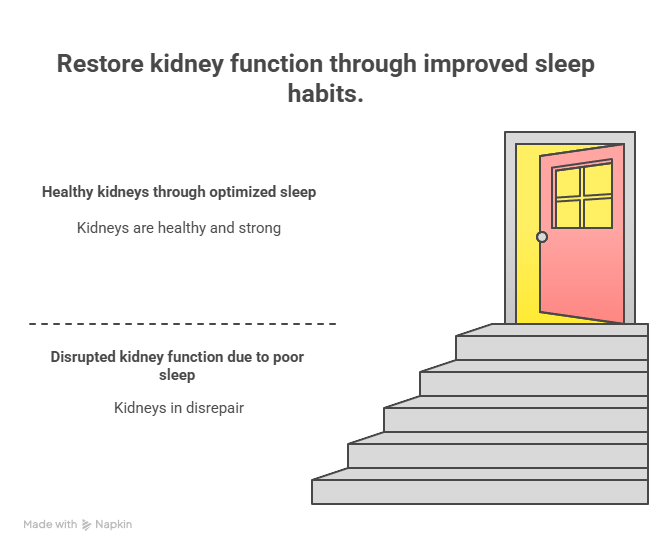
Your stress levels might be silently sabotaging your kidneys, and you may not even realize it.
When we think about kidney disease, we often focus on physical culprits: high blood pressure, diabetes, or dietary choices. But as a functional nephrologist, I’ve learned through both clinical practice and personal experience that there's another powerful, often hidden driver of kidney dysfunction, your mind.
In this blog, I want to bring attention to something deeply transformative: the connection between your mental and emotional health and the state of your kidneys. If you’ve been told your kidney disease is “inevitable” or “progressive,” and yet something inside you feels unresolved, emotionally or mentally, this conversation is for you.
Because what affects the mind, affects the body. And when it comes to the kidneys, this couldn’t be more true.
The Emotional Undercurrent: Real Stories from the Clinic
I remember working with a patient, a man in his late 50s who had been managing type 2 diabetes for years. He followed all the usual medical advice, diet, exercise, medications. But his kidney function continued to decline.
As I listened more deeply to his story, he revealed a painful truth: the sudden loss of his son five years prior. He never spoke about it, not even in his regular medical visits. The trauma and stress were buried deep, manifesting quietly through elevated cortisol, disturbed sleep, and persistent inflammation.
Once we began to address his emotional health with trauma-informed therapy, breathwork, and nervous system regulation practices, something remarkable happened. His GFR stabilized for the first time in years. His blood pressure improved. His energy returned.
This isn’t a miracle. This is the power of healing the whole person.
Stress and the HPA Axis: A Hidden Burden on Your Kidneys
Let’s start with how stress affects your biology.
When you experience stress, whether it's from a deadline at work or unresolved trauma, your body activates a survival system known as the HPA axis (hypothalamic-pituitary-adrenal axis). This leads to the release of cortisol, your primary stress hormone.
In small doses, cortisol helps you adapt. But chronic stress causes sustained high cortisol, and here’s what that does to your kidneys:
- Increases sodium retention, leading to fluid overload and high blood pressure
- Constrains blood flow to the kidneys, impairing filtration
- Triggers inflammatory pathways that damage kidney tissue
- Weakens immune regulation, increasing susceptibility to infections that further harm the kidneys
Think of your kidneys like a sponge. Under constant stress, they become saturated with inflammatory signals and hormonal imbalances, unable to recover or detoxify properly.
Many of my patients arrive with “mystery kidney problems” and no classic risk factors. Yet underneath it all lies a story of unrelenting stress: divorce, caregiving fatigue, financial insecurity, or childhood trauma.
The body keeps the score, and the kidneys are among the most sensitive scorekeepers.
Trauma Isn’t Just Psychological, It’s Physiological
Trauma, especially unresolved emotional trauma, goes beyond just feeling sad or anxious. It literally changes the wiring and chemistry of your brain and body.
Traumatic experiences, especially those early in life, can alter the tone of your nervous system, making you more likely to stay in a sympathetic “fight or flight” state. This state raises heart rate, blood pressure, and inflammatory markers, all of which contribute to chronic kidney strain.
One powerful mechanism here is inflammation. Trauma and PTSD are linked to higher levels of pro-inflammatory cytokines, which not only affect your mood and energy but also accelerate the progression of chronic diseases like CKD.
Additionally, trauma affects your behavior. It may drive you toward poor sleep, overeating, or substance use, all indirect contributors to kidney stress.
If you’ve ever felt that your body reacts strongly to emotional triggers, it’s not in your head. It’s in your nervous system, and your kidneys are listening.
The Role of Sleep: Your Kidneys’ Daily Reset
Here’s something few patients are ever told: Your kidneys have their own circadian rhythm.
Just like your brain, your kidneys operate on a daily cycle. At night, they go into repair mode. They manage waste, regulate fluid balance, and adjust blood pressure in sync with your sleep-wake cycle.
When you get poor or irregular sleep, this rhythm is disrupted. That leads to:
- Impaired filtration
- Blood pressure spikes
- Hormonal imbalance (especially aldosterone and vasopressin)
- Decreased repair and detoxification
Poor sleep also heightens cortisol and increases systemic inflammation. Over time, this can lead to what I call “invisible kidney burden”, stress your doctor might not see on labs yet, but which is quietly reducing your kidney resilience.
Supporting sleep isn’t just about going to bed early. It’s about healing your circadian biology. That might mean:
- Exposing yourself to natural light in the morning
- Limiting screen use 2 hours before bed
- Following consistent sleep and wake times
- Using breathwork or meditation to signal safety before bed

Sleep is not optional for kidney health, it’s foundational.
How to Support Your Mind-Kidney Connection: A Functional Approach
In functional nephrology, we go beyond labs. We ask, what is the root cause of dysfunction? And in many patients, the answer lies in the mind-body connection.
Here’s how I guide my patients to support their kidneys by nurturing their mental and emotional health:
1. Regulate the Nervous System
Use daily practices that signal safety to your brain and body:
- Deep belly breathing (5-10 minutes daily)
- Vagal nerve toning exercises like humming, gargling, or cold exposure
- Mindfulness-based stress reduction or guided meditation
- Therapeutic journaling to process emotional triggers
When the nervous system feels safe, the kidneys can focus on their job, not reacting to constant threat signals.
2. Heal from Trauma (with Support)
If you have a history of trauma, especially childhood adversity, working with a trauma-informed therapist can be life-changing.
Therapies like EMDR, somatic experiencing, or internal family systems (IFS) have shown promise in reducing the physiological impact of trauma.
You’re not broken. Your body adapted to survive. And now, with the right support, you can create a new internal reality.
3. Support Sleep as a Non-Negotiable
Sleep is the foundation on which kidney recovery is built. I often recommend:
- Magnesium glycinate or L-theanine to calm the mind
- Blue light blockers for screen time
- Creating a dark, cool, quiet sleep environment
- Limiting caffeine after 2 PM
Tracking sleep with devices or journals can help spot patterns and improve consistency.
4. Use Nutrition to Support Mood and Resilience
What you eat directly affects your mood, and therefore your stress response.
- Increase omega-3 fats (chia seeds, flaxseed, walnuts, fatty fish) to lower inflammation
- Focus on B-vitamin-rich foods (leafy greens, lentils, eggs) for neurotransmitter balance
- Reduce blood sugar spikes with protein and fiber at every meal
Stable blood sugar = stable mood = less kidney stress.
5. Cultivate Joy, Not Just Manage Stress
True healing doesn’t come from avoiding stress, it comes from increasing joy, connection, and purpose.
Laughter, creativity, meaningful work, spiritual connection, time in nature, all of these nourish the parasympathetic nervous system and boost resilience.
If you only focus on what’s wrong, you’ll miss what’s possible.
The Power of Being Seen
If there’s one thing I’ve learned as a functional nephrologist, it’s this:
Many patients aren’t just looking for a prescription. They’re looking to be seen, fully, compassionately, and as a whole person.
You are not just your GFR. You are not your lab results. You are a dynamic, living being with emotions, memories, values, and a story that matters.
And your kidneys are listening to that story. They are deeply sensitive to how safe you feel, how you process your emotions, and how well you nourish both your mind and your body.
Closing Thoughts
The mind-kidney connection is not a theory, it is a lived reality for countless patients. Chronic stress, trauma, and sleep issues can erode kidney function silently, even when your labs look “normal.”
But there is hope.
By honoring your story, supporting your nervous system, improving sleep, and using targeted functional medicine approaches, it’s possible to reclaim not just your kidney health, but your vitality.
You don’t have to accept decline as your only option. There is always more to explore, more to heal, and more within your power than you’ve been told.
Your body is wise. Your mind is powerful. And together, they hold the keys to a healthier future.
Special Offer
Take $50 off your first visit and discover how personalized, root-cause medicine can transform your health.
Ready to take the next step? Schedule your consult with Dr. Bismah Irfan and begin your healing journey from the inside out. https://www.drbismah.com/
